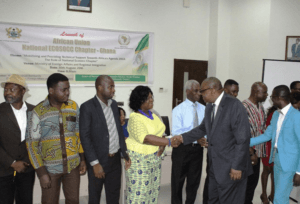Ghana launches AU Chapter on socio-economic policies
 Ghana has launched its chapter of the African Union (AU) Economic, Social and Cultural Council (ECOSOCC), an advisory body comprising Civil Society Organisations (CSOs), aimed at mobilising support for policies and programmes of the regional body.
Ghana has launched its chapter of the African Union (AU) Economic, Social and Cultural Council (ECOSOCC), an advisory body comprising Civil Society Organisations (CSOs), aimed at mobilising support for policies and programmes of the regional body.
Mr Emmanuel Bombande, a Deputy Minister of Foreign Affairs and Regional Integration, said Civil Society Organisations had an integral role to play if Africa was going to move forward with the goals and objectives of its Agenda 2063.
Speaking at launch of ECOSOCC in Accra, on theme: ‘Mobilising and providing technical support towards Africa’s Agenda 2063: The role of National ECOSOCC Chapter’, he stated that the role of civil society had to be “integral, functional, active and very important”.
He said the launch of the Chapter provided an opportunity to brainstorm on creative and innovative strategies to disseminate information and mobilise support for AU programmes and activities.
It would also help to promote, sustain and implement continental obligations and commitments at the national level.
He noted that CSOs played an important role in consultations leading to the adoption of the priority areas in Agenda 2063, which recognised that development on the continent should be people-driven with emphasis on the potential of women and youth.
He urged them to thus own the agenda and work towards its implementation, especially as it was reflected in Ghana development plans.
He pledged the Ministry’s readiness to work with the national ECOSOCC in its quest to collaborate with CSOs to continue to popularising Agenda 2063 and its first 10 years’ implementation plan.
Mr Bombande urged the media, as key stakeholders, to engage fully in the process.
Madam Pavelyn Tendai Musaka, the Zimbabwean Ambassador to Ghana, who is the Head of the African Diplomatic Corps, also urged CSOs and other organisations in ECOSOCC to take up the task of achieving the goals of Agenda 2063 and not leave it to the Governments.
“The AU belongs to us, citizens, and not to Heads of State,” she said. “It is our responsibility to achieve Agenda 2063. Don’t leave it to governments, it is yours, own It and start working to achieve it.”
She said while AU Heads of State had adopted quite a number of policies, what was missing was the operationalisation of the policies.
The launch of the Chapter, therefore, means that Ghana is facilitating ECOSOCC to carry out its mandate to promote dialogue within all segments of the African societies on issues about the continent towards the sharing of best practices and expertise.
Mr. Samuel Dotse, the Deputy Presiding Officer of the Ghana Chapter of ECOSOCC and representative of HATOF Foundation, one of the two CSOs representing Ghana on the ECOSOCC at the continental level, said Ghana was joining Togo, Kenya, Nigeria, Zambia, Algeria, Cameroon, Mauritius and others, who had established their national chapters.
The Council, he said, was established in 2004 under the provisions of Articles Five and 22 of the AU Constitutive Act, as a vehicle for building a strong partnership between governments and all segments of civil society and also to provide an advisory opinion to the Summit of African heads of State.
Twenty four organisations, including the private sector, media, civil society organisations and academia, form the national chapter.
“The distinctive character of the AU ECOSOCC is that it is an opportunity for the African Civil Society to play an active role in charting the future of the continent, and to contribute to the principles, policies and programmes of the AU,” he stated.
Source: GNA
